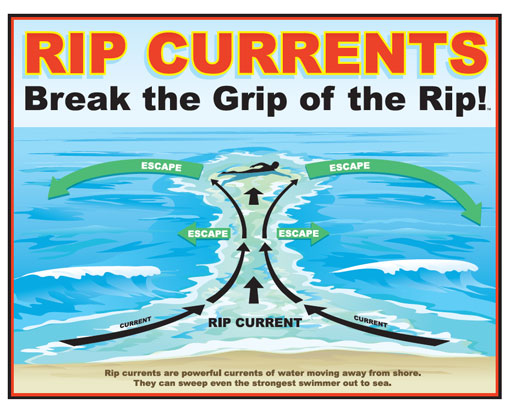The Cape Hatteras National Seashore (Seashore) urges visitors to check the rip current and beach condition forecast before heading to the beach.
Range forecasts and text alerts
Daily beach forecasts from the National Weather Service (NWS), located at www.weather.gov/beach/mhx, includes rip current risk levels and information on other beach hazards. Visitors to the Outer Banks and Seashore are also encouraged to sign up for text alerts from lifeguards, sea rescue agencies and the NWS by texting “OBXBeachConditions” to 77295.
Extraction currents
Rip currents are powerful currents of water that flow away from the shore. They are responsible for numerous water rescue attempts along the North Carolina coast each year.

Supervised beaches
Lifeguard beaches are the safest places to swim by the sea. There are four beach locations that are staffed with lifeguards from Memorial Day to Labor Day weekend (9 a.m. to 5 p.m.). The locations of the four supervised beaches are:
Ocean and Beach Safety Tips
- Bring something in the water with you that floats.
- Rather than struggling with a rip current and wearing yourself out, bring something into the ocean that floats and moves easily away from the rip current. Float Don’t Fight.
- Swimming in the Atlantic Ocean is not the same as swimming in a pool or a lake. Swimming in the ocean can be very physically taxing and can exacerbate underlying medical issues in older swimmers.
- A perfect day on the beach doesn’t always mean it’s a perfect day in the ocean. If in doubt, don’t go out.
- Never swim alone. Swim with a buddy and have adult supervision for all children. Have someone on shore watch you while you swim/surf/wade in the water.
- Remember that many people drown trying to save someone from a rip current. Use flotation and make safe choices.
- Be aware of additional hazards, such as lightning, high waves and shore break. Learn more about lovethebeachrespecttheocean.com.
- Avoid wearing shiny objects that could attract sharks and other fish.
- Avoid swimming where danger is present: in rough seas; entries; around fishing piers and surfers; the night; or during thunderstorms

